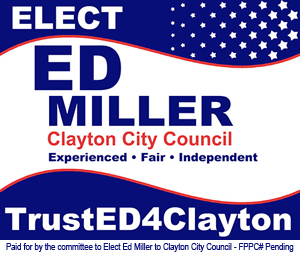Clayton City Council candidate questions: Ed Miller
The Concord Clayton Pioneer newspaper presented a list of questions to the candidates running for Clayton City Council in the 2022 election. To read other candidate answers, click here. For our story on all the candidates running in this race, click here.
 Why do you want to serve on the Clayton City Council?
Why do you want to serve on the Clayton City Council?
I’ve lived in Clayton nearly 20 years, and for most of that time things have run smoothly. Recently though, problems have escalated dramatically around housing, transportation, maintenance and finance. I stepped up to help by giving my time to serve on the city’s Planning Commission and the Contra Costa Transportation Authority’s Citizens Advisory Committee. Now I hope to take everything I’ve learned and put it to work as a member of the City Council.
What personal skills and knowledge will you bring to the Council?
To be effective in this position, the job demands personal integrity, a service mindset, a deep familiarity with community and the ability to build consensus. Integrity and a desire to serve were instilled in me at a young age through church and Scouting. I’ve spent years building relationships with people from every part of our town through my volunteer work, learning all about our community and its history. I will lean heavily into those relationships to help us hear each other better, overcome our differences, and agree to work together for the benefit of all of Clayton.
 What experience do you have that qualifies you to serve? Include professional and volunteer work on civic, community or charitable projects.
What experience do you have that qualifies you to serve? Include professional and volunteer work on civic, community or charitable projects.
My expertise as a senior data engineer is exactly the skill set the city needs to navigate through its current and future fiscal challenges. Every day, I survey huge amounts of my company’s financial data, looking for trends. If I spot problems, I determine the cause and propose solutions.
I also have more experience than some of the other candidates in the public policy space. I’ve been serving for years as the city’s representative of the Contra Costa Transportation Authority’s Citizens Advisory Committee (CCTA-CAC), and also on the Clayton Planning Commission. I was appointed to the CCTA-CAC in 2019 and served as its chairperson in both 2020 and 2021. I was appointed to the city’s Planning Commission in 2021 and currently serve as vice-chairperson. During my tenure, I participated directly in the creation of the draft of the Regional Housing Needs Allocation (RHNA).
How long have you been a Clayton resident?
Since 2003.
Current revenue growth is projected to be 2-3% per year while expenses as projected are anticipated to increase at 4% or more. This trend may worsen in the coming year due to historically high levels of inflation and general economic uncertainty that has resulted from the COVID-19 pandemic, and other world economic factors. To reach a balanced budget in 2023 and onward, the city must either significantly cut services or increase revenue. If you think the city should balance the budget by cutting costs and services, what specifically would you cut? If you look more toward increasing revenue, how would you do this?
While I will suggest some possible avenues to investigate, no candidate could realistically provide specific recommendations without significantly more detailed data than what’s on the city’s website. I intended to request such data but learned that the city’s Finance Director recently resigned after only 11 months with us, an unfortunate recurring pattern among our senior city officials.
We could try to grow revenue by hiring a grant writer for the city if we believe they could bring in more money than they cost. If we can’t grow revenue enough to close the gap, there are some common strategies employed by small cities to share expenses that are definitely worth exploring. We might also find some non-core department activities that are a drag on productivity that could be contracted out for less and improve city services, which would make both our citizens and our employees more satisfied.
Ultimately, if we can’t grow our way out of it and we can’t win with efficiency, I would work with city staff to scour the general ledger detail to identify potential cuts and their impacts to service levels. The City Council must then put all options before our citizens, with full transparency, soliciting public input from everyone before acting.
We still have nearly $1.5M in Federal pandemic funding to cushion us long enough to make solid decisions that will fix these imbalances long-term, rather than kick the can a year or two down the road.
The governor has made the housing crisis a number one priority for the state. Cities are being mandated to provide more housing units than has been required in the past and it’s likely that even denser housing plans will be required in the future. Where do you see this going for a small city that is nearly built out? How should the city plan for meeting these mandates?
As the only candidate currently serving on the Clayton Planning Commission, I participated directly in the creation of the draft RHNA which has been submitted to the state for review. They rarely accept the first draft, so there is likely still some work to be done.
Rather than seeing this as a “done deal,” as a city we need to form some strategic response to the state’s current housing strategy, which basically removes the city’s ability to review all but the most extreme safety and environmental impacts of proposed housing projects. This approach is unsustainable, and it will produce many negative impacts on our quality of life, traffic and public safety, commute times, and greenhouse gas emissions. There are better solutions that would give families more time at home together and distribute economic opportunities more equitably, without cramming houses on top of houses in the suburbs.
If elected, I would consider it one of the city’s top priorities to develop coalitions with other cities and state legislators to change the state’s approach to the housing crisis. There are allies in Sacramento and all over the state who want to work together for the same common sense solutions. I’ve discussed this need passionately and repeatedly in public meetings of our City Council and every public body on which I serve. The only options I ever hear from members of the City Council or the public are “there’s nothing we can do” or “let’s fight the state in court”. No one is doing anything. Housing and transportation are issues that affect every aspect of our lives. This is what I wake up and go to sleep thinking about. This is why I decided to seek a seat on our City Council.
What do you see as the single biggest challenge for the city going into 2023?
A city without fiscal sustainability can’t achieve anything else, so stabilizing the budget has to be the number one priority. But we also must start the lengthy process to build alliances with others to alter the state’s path out of the housing crisis. We have to do both.
What is your vision for Clayton in the next 4 years? Long term?
My goal for the next four years is to work with all other members of the City Council to lay sound financial groundwork for our city. That will free us from worry so that we can focus on the next big chapter for our little town. I’d like to see something that plays up our Old West charm, makes us a local destination, and fosters a burgeoning retail and restaurant district. All while adding local jobs for our residents both in Clayton and also in nearby areas, shortening commutes so that our folks can be home in time for dinner with the kids.
What role will you play in realizing that vision?
My ability to dissect financial data and build visualizations to help others see the solutions will be key to laying that solid financial groundwork. Following that, I want to give my full voice to the economic, housing, and transportation changes that will make the vision I described above a reality.
